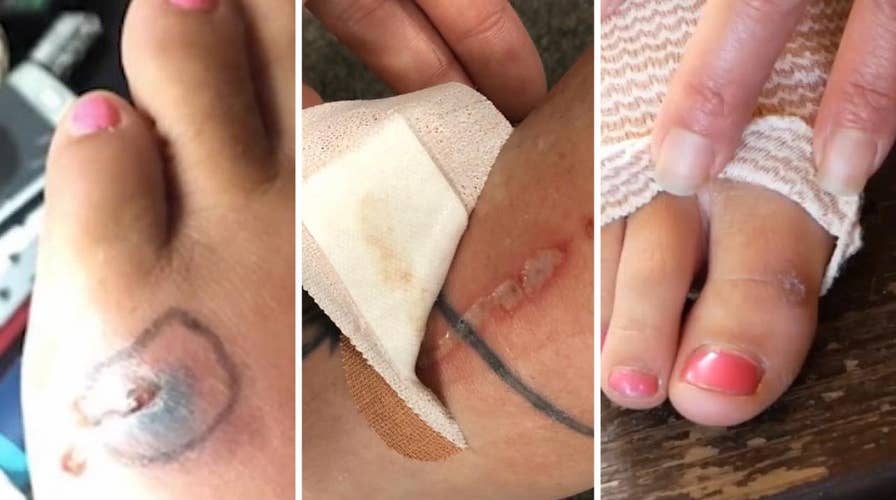More flesh-eating bacteria cases reported in Florida
Although the infection is not very common, scientists expect more cases to be reported as the weather gets hotter as the bacteria flourishes in warm water.
Another case of flesh-eating bacteria landed a Florida woman in the hospital recently after she entered the water with a small cut on her foot. Leann Thibodeau, who said the cut already scabbed over, had visited Manasota Beach shortly before the Fourth of July, but by the time the holiday rolled around, she couldn’t even walk.
FLORIDA MAN SAYS HE CONTRACTED FLESH-EATING BACTERIA INFECTION DESPITE NOT ENTERING WATER
“For those of you that know me .. know that the Beach is My Most Favorite place on Earth,” she wrote in a July 5 Facebook post. Well this past Saturday I decided to visit manasota beach, a beach I’ve never been to. I had a tiny pin hole sized cut on my foot and had a scab on it. Didn’t think anything of it. By Tuesday it became so infected and swollen. Yesterday morning Thursday it was so swollen I could hardly walk on it.”
According to her post, she underwent surgery at 10 a.m. on Friday and a nurse allegedly told her she has group A Streptococcus, which the Centers for Disease Control and Prevention (CDC) names as a cause of necrotizing fasciitis, also referred to as flesh-eating bacteria.
“I was diagnosed with the flesh eating bacteria,” Thibodeau wrote, in part. “I joked about it for 3 days prior too. Guess you shouldn’t joke about it. So with that being said I’m warning you. To All My Friends. From Sarasota to port Charlotte. There is a High advisory in the water for bacteria. All the beaches should be closed right now. So so Sad that my favorite place is now infected not only with Red tide but also flesh eating bacteria. Be careful my friends.”
BOY INFECTED WITH FLESH-EATING BACTERIA DURING TRIP TO MARYLAND BEACH, MOM SAYS
Thibodeau’s ordeal is not that different from several other cases reported in Florida, including a 12-year-old who was vacationing with family and had entered the water with a cut on her foot, and a 77-year-old woman who died from the infection after scratching her leg in a fall while walking in the water.
But despite the uptick in reports, at least one doctor said he expects the numbers to continue to rise through August, when the temperatures are even higher.
“Incidences of infection increase as the waters get warmer and warmer,” Dr. Matt Swearingen, of Florida Gulf Coast University, told Fox 13 News.
The CDC estimates up to 1,200 cases of necrotizing fasciitis occur in the U.S. each year, but admits the number “is likely an underestimate.”
Patients with underlying health issues like diabetes, liver disease, compromised immune systems and heart problems are also at an increased risk of infection.
“The one characteristic of these infections is they spread very quickly,” Dr. Gregory Baker, an AdventHealth physician, told Fox 13 News. “It’s important that when the infection is found, the individual needs to seek treatment and the treatment with a physician needs to be aggressive.”
CLICK HERE TO GET THE FOX NEWS APP
The Florida Department of Health advises beachgoers to check its website for water quality reports before heading into the waves. It also cautions not to enter the water with fresh cuts or scrapes.


